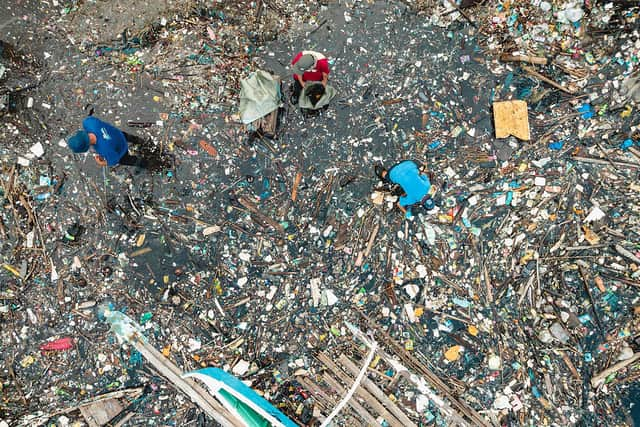Efforts to reduce the production and distribution of plastic have been weak - Andy Brown
Some quite sensible small things have been done to reduce consumption of plastics. Such as the reduction in use of plastic bags. Other ideas such as introducing small deposit charges on bottles that would be refundable on their return to any retailer have not even been tried.
Efforts to reduce the production and distribution of plastic and to tackle the problem at source have been much weaker. Despite the fact that this is the only systematic way to make a serious impact.
Advertisement
Hide AdAdvertisement
Hide AdIt would be very easy to pass legislation to prevent the likes of Amazon from delivering packages that contain hundreds of tiny plastic pellets which are only there to prevent the contents from being damaged during delivery and are immediately discarded without any prospect of ever being recycled. Nothing meaningful has been done. Nor is there anything preventing the use of plastic grass which sheds billions of particles.


Thanks to such casual disregard for our environment, we now live on a planet that has a thin film of plastic covering every part of it. Scientists have tested for microplastics on the highest mountains and the most remote Antarctic ice sheets. They have found them in their millions. Scientists have descended to the deepest parts of the oceans 36,000 feet down at enormous pressures. They found particles building up on the seafloor.
When tests are done on human bodies tiny bits of plastic can be found inside every single one of us. That includes the placentas of new born babies. Mothers are unknowingly feeding microplastics throughout the pregnancy. Once toddlers start crawling across the carpet they will breathe in millions more. Most carpets contain plastic.
It is relatively easy to see the impact of large bits of plastic such as those in the huge North Atlantic garbage patch which has more than 200,000 in every square kilometre. Wildlife like turtles get visibly caught up in plastic wrappers. It is harder to see the impact of miniscule pieces on plankton that forms such a vital part of the food chain.
Advertisement
Hide AdAdvertisement
Hide AdLittle plastic sacks of fine mesh materials are frequently used to wrap oranges and the like. They have absolutely no impact on the shelf life of the product. Those nets are deadly to fish once they get into the sea.
It isn’t easy to understand why so much of the plastic we buy ends up in the ocean. In any logical world people who put things into the right bins would reasonably expect their local council to recycle them. Most councils achieve little better than a 50 per cent recycling rate and with cuts to their budgets few are improving.
Taking a trip to even the most sophisticated recycling unit is a sobering experience. The last time I went I saw massive tumblers churning rubbish to wash, sort and separate it. Long strips of magnetic tape, from no longer wanted cassettes, had wrapped around other plastics to form such an impenetrable ball of trash that the machine was stopped and a human being had to climb inside to clear the obstruction. What I didn’t see was the sheer quantity of British rubbish that got sent abroad to be picked over by dirt poor workers in China. Before their government got wise to the dangers and refused to let their country be our dump. After which we scarcely improved our performance at all. Instead, we simply switched to using different countries.
Roughly two thirds of UK plastic waste is sent abroad for recycling. The bits that can’t be commercially reused get casually dumped. Much of it into rivers and then the sea. There is no beach anywhere in the world so remote that you can walk across it without finding plastic.
Advertisement
Hide AdAdvertisement
Hide AdThat doesn’t mean that it is useless to try and separate out your rubbish and clean plastic. Done carefully, separation of plastic makes what you put into your bin commercially valuable so it both cuts your council tax and helps the environment.
It does mean that all the time and care spent by individuals is dwarfed by the carelessness of the production and distribution chain There is no legislation in the UK that requires manufacturers to put clear standardised labels on products telling people honestly whether it can be recycled and how. Even statements about packaging being biodegradable aren’t backed up by any serious rules that properly prevent fraudulent claims. Every council uses a different system for recycling and money has been desperately scarce for improvements.
If we are serious about looking after the environment that has to change. The road to hell is often paved with good intentions. The route to seriously controlling plastic pollution hasn’t even begun.
Andy Brown is the Green Party councillor for Aire Valley in North Yorkshire.
Comment Guidelines
National World encourages reader discussion on our stories. User feedback, insights and back-and-forth exchanges add a rich layer of context to reporting. Please review our Community Guidelines before commenting.